President Labberton Witnesses Firsthand New Developments in Chinese Theological Education
Posted 01/22/2018 in Missiology Conversations
This blog is part of an ongoing series on theological education in China, read Dr. Peter Lim’s article titled “20 Years of Innovative Education in China” here.
A June-July 2017 visit to China by Fuller President Mark Labberton and his delegation strengthened long-held ties between Fuller and leading centers of theological education in the country. The visit, organized by Fuller’s China Initiative, deepened understanding of the current state of theological education in China, fostered discussion of opportunities for Fuller to cooperate with Chinese seminaries and Bible colleges, and renewed personal relations between Fuller and Chinese seminary leaders.
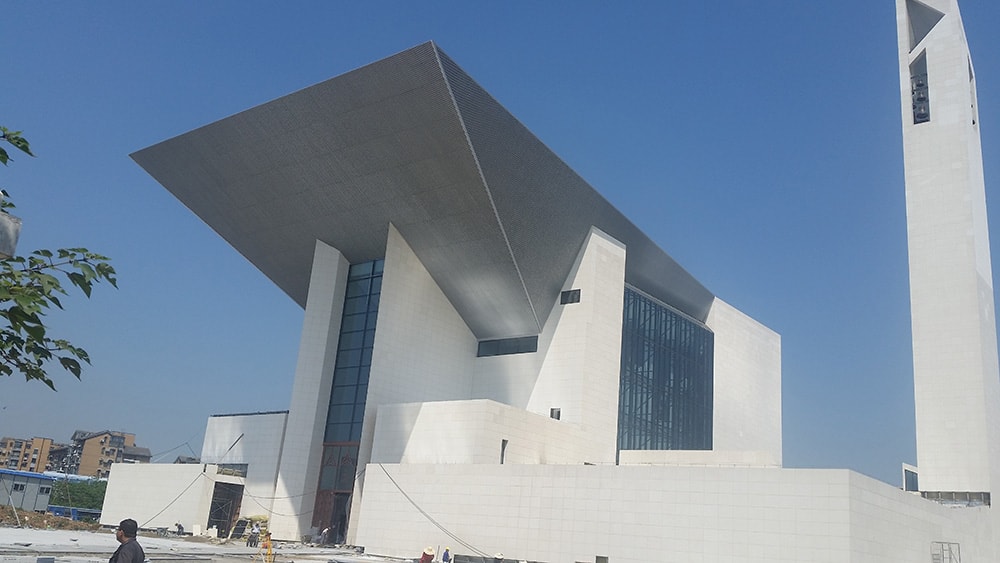
Nanjin Jinling Union Theological Seminary’s new chapel
The visit—the second by Dr. Labberton to China—highlighted:
- New degree programs
- Increased student capacity of seminaries
- Training for lay leaders as well as pastors
Accompanying Dr. Labberton were David Fung of Fuller’s Board of Trustees, who has been involved with Chinese seminary education for some time; Diane B. Obenchain, director of Fuller’s China Initiative; and Lu Shi-Min, program manager of the China Initiative. The delegation visited Nanjing Jinling Union Theological Seminary (Nanjing), Shaanxi Bible College (Xi’an), and Guangdong Union Theological Seminary (Guangzhou).
President Labberton, on June 30, addressed the 2017 graduating class of Nanjing Seminary, an event celebrated in the school’s new, architecturally distinctive chapel that opened June 6, 2017. Fuller’s ties with Nanjing Seminary stretch back to the late 1980s, especially through the warm friendship between Bishop K. H. Ting, then president of Nanjing Seminary, and former Fuller President Richard J. Mouw.
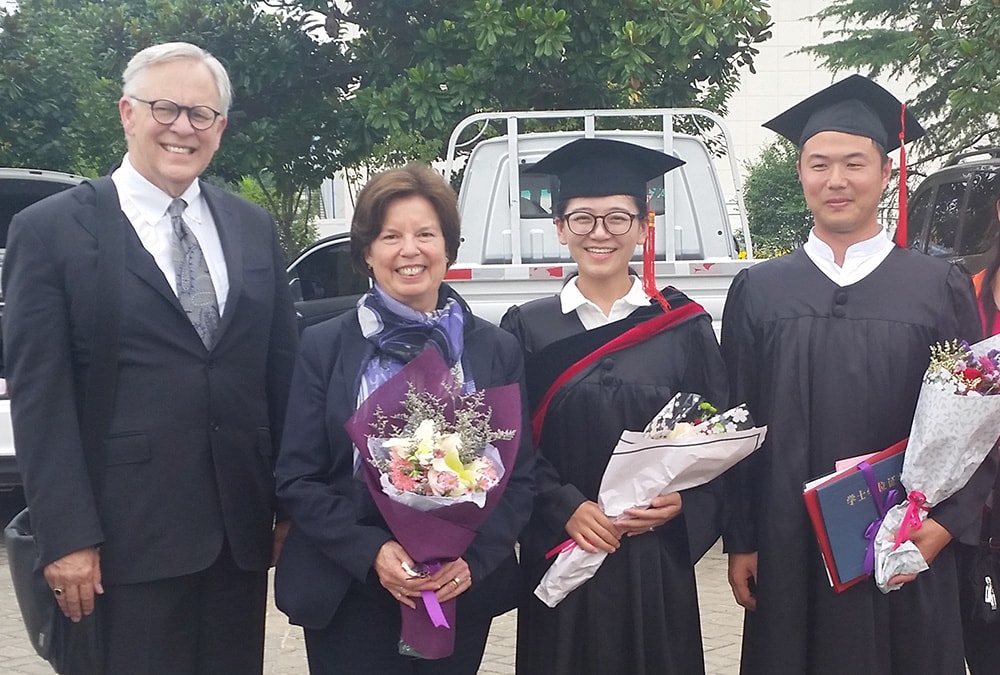
Dr. Labberton, Dr. Obenchain, and NJUTS graduates, June 2017
Nanjing Seminary, China’s one national Protestant seminary, takes the lead in Chinese theological education with its new programs. In Spring 2017, Fuller’s Dr. Obenchain (School of Intercultural Studies) taught two eight-week courses: one in research methods for the inaugural class of China’s first ThD (Doctor of Theology) program, and the other a master’s-level class on “Christianity and Confucianism.” In June 2017, Fuller’s Kenneth Wang (School of Psychology) was among those led by Executive President Chen Yilu and Academic Dean Lin Manhong to design a new DMin program, with a focus on pastoral psychology. Most recently, in mid-December, Hak Joon Lee (School of Theology) returned from Nanjing Seminary, where he taught two eight-week courses in Christian Ethics.
The increasing numbers of those seeking a seminary education are particularly evident at Shaanxi Bible College in the city of Xi’an, where, in the famous “Stele Forest,” one finds the renowned “Nestorian Stele” that records the entry into China of the Eastern Christian Church (Church of the East) in 635, during the reign of Emperor Taizong of the magnificent Tang Dynasty.
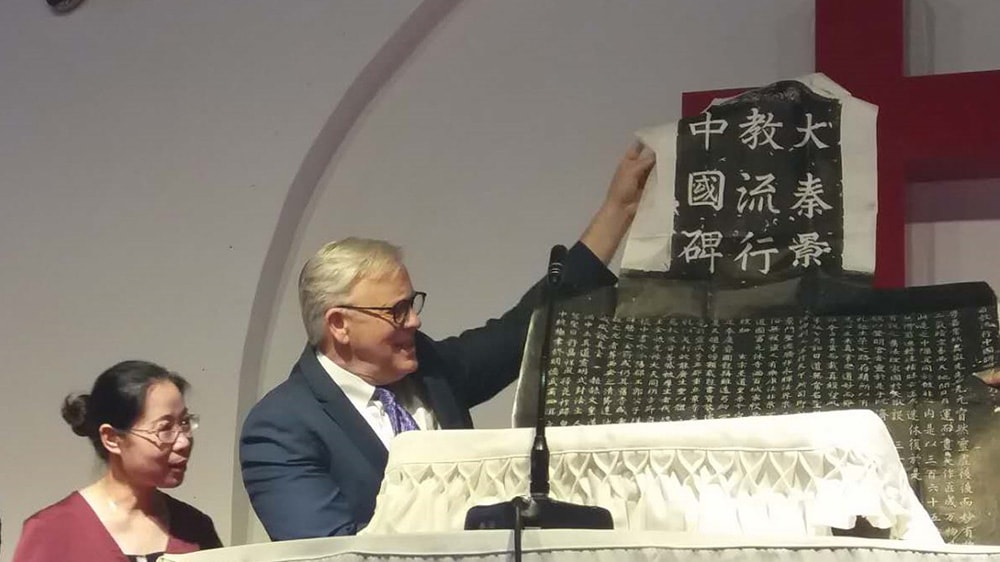
Dr. Labberton, with Rev. Dr. Wang Hong at his side, receives a treasured rubbing of the Nestorian Stele, given to him by Reverend Guo Donghang, President of Xi’an Christian Council and Senior Pastor of nan Xin Jie Church.
Rev. Dr. Wang Hong (Holly), principal of Xi’an Bible College and a former visiting scholar at Fuller Seminary, advised Dr. Labberton and his delegation of plans for a new campus that will increase enrollment to as many as 350 students. The school will be renamed Shaanxi Seminary and will serve the northwest region of China, which is home to many Muslims. Enthusiastically, Reverend Wang Jun, president of the Shaanxi Christian Council and Three-Self Patriotic Movement, described plans for an upcoming interfaith conference on Muslim and Christian folk music.
To train lay volunteers, Guangdong Union Theological Seminary leads the way with its extension classes. With avid interest, President Labberton and his delegation learned about this program as well as the seminary’s regular degree programs that focus on urban, family, and other social challenges. Eighty percent of pastors serving churches in Guangdong province graduate from Guangdong Seminary. Located in the city of Guangzhou (formerly Canton), where the first Anglo-Scottish Protestant missionary, Robert Morrison (1732–1834), presented his letters of introduction in 1807, Guangdong Seminary’s proximity to Hong Kong makes it convenient for visiting professors from Hong Kong and from elsewhere in the world to teach there.
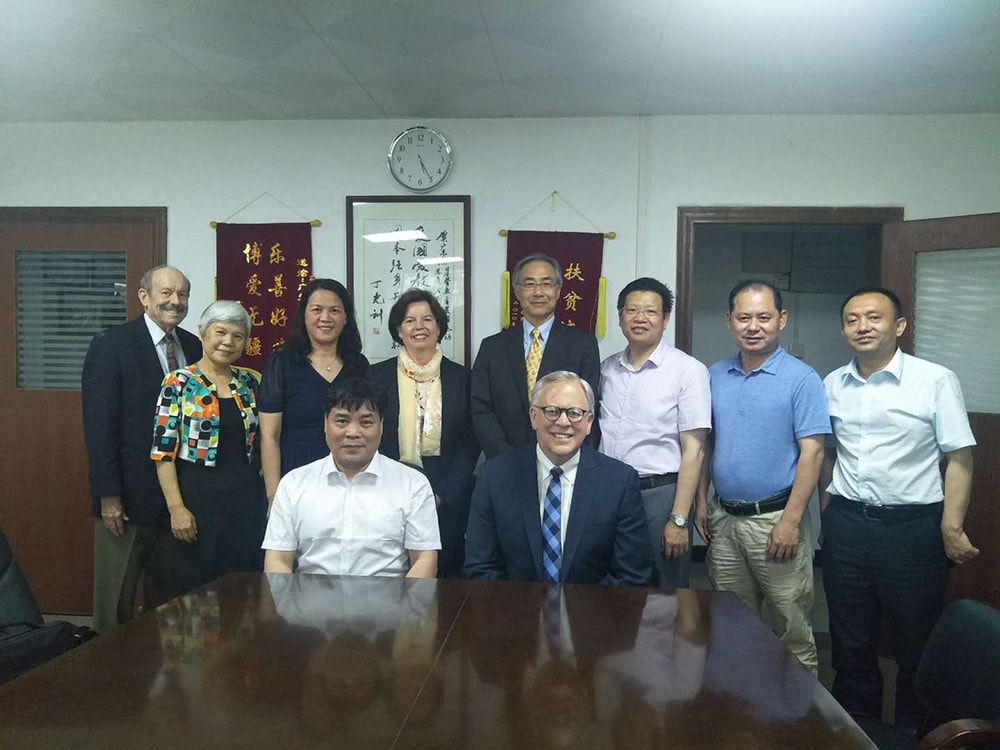
Front row (right to left): Rev. Dr. Mark Labberton, President, Fuller Theological Seminary; Reverend Fan Hong En, President, Guandong Christian Council. Second row (right to left): Rev. Pei Lianshan, Professor of the Reformation and of the History of Chinese Christian Thought, Guangzhou Union Theological Seminary and Fuller China Initiative Visiting Scholar 2015-2016; Rev. Lin Enling, Vice General Secretary, Guandong Three-Self Patriotic Movement; Rev. Dr. Cai Jianwei, Vice General Secretary, Guangdong Three-Self Patriotic Movement; Dr. David Fung, member Fuller Board of Trustees; Dr. Diane Obenchain, Director of Fuller China Initiative; Rev. Wang Zhaoping, Vice President, Guangdong Christian Council; Ms. Shi-Min Lu; Program Manager of Fuller China Initiative; Mr. Dennis Donahue, spouse of Dr. Obenchain.
Having learned how China’s leading Protestant seminaries—with new academic offerings, expanding campuses, and extension classes for lay leaders—are addressing important needs of China’s Protestant church today, President Labberton and members of his delegation returned from China deeply inspired by and dedicated to continuing cooperation with its sister education institutions in China.
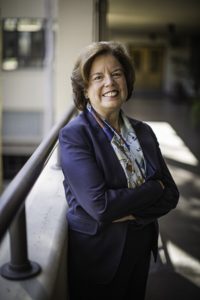
Dr. Diane Obenchain is Director of the China Initiative and Professor of Religion at Fuller’s School of Intercultural Studies.

